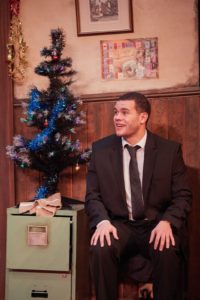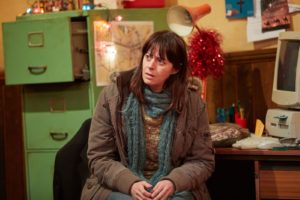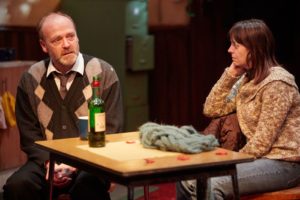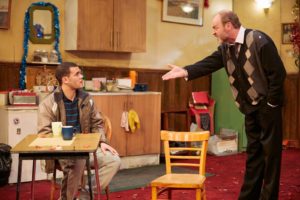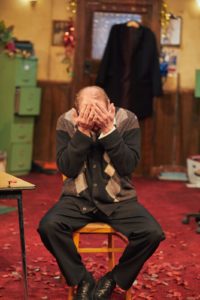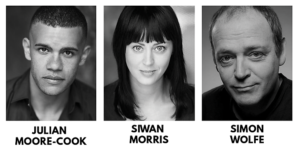
The Greatest Showman comes in loud and proud to be a movie musical. I relishes in it’s ability to sing and dance and show colour before you. I wonder how it will fair with the not clear advertising that seemingly wants to hide the fact that it’s musical.
It’s opening song says that you yourself want to be entertained with a musical and showmanship and it will provide. If you are not in for the ride now you should leave the theater because then it’s not for you. We are then taken back in time to a young boy named P.T. Barnum, he is the son of a poor tailor, they serve some sort of rich man who has a daughter (guess what happens). Time passes and as they grow up and marry two children join them. While working as a clerk at a shipping company everyone looses their job because all the ships were sank. So he is out of a job but also reflects that this is not the life he promises his wife and seeks out wonder. He opens a museum of oddities, but mannequins and stuffed animals don’t do good business. So he seeks out real life oddities, little people, giants, women with beards etc.
Hugh Jackman is by no means a closeted musical lover. He has spoken about it in interviews, hosted the Oscars with opening musical numbers and stared in other musicals and worn it on his sleeve very proudly. You can tell that he is so happy to be here as a character that gets to sing and dance to entertain you, he is of course no slouch in the singing and dancing department (he greatly excels at it in-fact).
To gain respect Barnum recruits Philip Carlyle (Zac Efron) a highbrow theater producer. He is talked into by being reminded that this career he is on gives him no joy and is sold on the promise of excitement in what he does (also a few shots). While working there a spark develops between him and the trapeze artist Anne Wheeler (Zendaya). They are an attractive movie couple and have both acting and dancing chemistry together. I want to highlight Zendaya’s performance because she very strongly conveys the characters repressed mentality to the public with very little screen-time she’s given, possibly due to limited run-time and a lot of focus given to Barnum. But knowing that she is completely different from how she was in Spider-Man: Homecoming truly highlights her as a talent to watch-out for.
This is Michael Gracey’s directorial debut however he has been in the business since 1997. He has been a visual effects artist, which he probably channeled into his vision of this bouncing, high speed world. I believe this man has a strong future in this business.
It wouldn’t be much of a musical if the songs weren’t up to scratch. Most of them are big, upbeat showy numbers designed to impress. There are variations, with ones of different genres and slower and/or more intimate ones. They are catchy and have visuals that compliment them nicely, but they don’t really push the characters and story forward very much, they are just minor moves in the plot or a character saying what we already know about them.
This movie is so happy to be doing what it does. The director absolutely got high on their own supply and got actors that are just as happy to be dancing and singing for us. There are shortcomings, in the passing and compared other top movie musicals, like La La Land, it falls short of perfection. But the movie’s smiles and enthusiasm melts away all those criticisms and made me and will probably leave you smiling.

Jonathan Evans
Category Archives: Theatre
Review Dublin Carol, Sherman Theatre, Cardiff by Roger Barrington
 (4 / 5)
(4 / 5)
Recently crowned Regional Theatre of the Year, Sherman Theatre maintains its recent run of excellent productions with Conor McPherson’s play Dublin Carol.
So highly regarded after Conor McPherson’s smash 1997 play The Weir, the Royal Court Theatre in London, (known as The Writers’ Theatre), reopened with Dublin Carol after a lengthy closure due to redevelopment. First performed in February 2000, it later opened Off-Broadway almost three years later to the day, and both productions received widespread critical acclaim.
The play is set in three parts, all occurring on Christmas Eve. The design layout is prescribed in the playtext. An office, (which happens to be in North Dublin, where all Mcpherson’s famous early monologue plays are set), is rather shabbily decorated with Christmas decorations that have seen better years. These decorations have been rather casually put up, reflecting upon the character of the man who inhabits this space in its lack of effort. Religious icons such as a crucifix and the presence of an advent calendar, with only a few dates left to be opened are prevalent as is a fairly nondescript one foot high artificial Christmas Tree. A small electric fire is found centre stage with a long flex loosely lying to a power point some distance away. A small kitchen area, filing cabinets and desk indicate that this is an office rather than someone’s abode, and the text soon reveals that it belongs to an undertaker.
This play is a three-hander with the protagonist John appearing throughout. The first and third parts are played with a young man Mark and the middle featuring John’s estranged daughter Mary.
Comparisons are easy to make to Charles Dickens’s A Christmas Carol, also set on Christmas Eve. You can relate Mary to the Ghost of Christmas Past, as the dialogue between her and her father reveal the severe familial problems that have occurred in the past. Mark, who is also performing undertaking duties on a temporary basis to aid his uncle Noel, (Christmas), who is laid up in hospital. Mark is in a relationship with an air stewardess and in part three you find that this is suffering from considerable strain with the young man wishing to break loose. Mark can be looked upon as the Ghost of Christmas Future, because John offers advice on the course of action to be taken by his young colleague.
However, McPherson isn’t a Dickensian disciple, and for that matter, neither is he a satirist. Unlike Scrooge who undergoes a transformation from miser to philanthropist, you are not going to see such a change in John over the course of a single day.
For John is an alcoholic, and one who finds an excuse for every miserable act he has committed in his life to date, influenced by drink. Conor McPherson, also, has suffered from a closer encounter with the “demon drink” than is too good for his health. However, it would be wrong to consider this play is about alcoholism, although it takes central stage. Also, it would be incorrect to surmise that Dublin Carol is autobiographical. In fact, a major health breakdown caused by his excessive drinking was suffered by the playwright after his his next play, Port Authority, (2001). It is on record that subconsciously in the playwright’s mind, Dublin Carol may have premeditated the events of the following year.
The play, also has a character named Carol in it. She was John’s girlfriend when he was married, but was rejected due to her providing her liver with carte blanche authority to do what he liked. There were no conditions to their relations and ultimately John rejected her because he needs some sense of structure in his life, which Noel, the owner of the undertaking business, who has taken him on, despite knowing about his problems with alcohol. John is a natural successor to the masculine self-pitying, ready to apportion blame on everyone except themselves, anti-heroes of McPherson’s earlier monologic characters.
John is played by Simon Wolfe with a ferocious intensity that seamlessly changes from high good humour to savage anger.
The two supporting actors, Welsh actress Siwan Morris as Mary and Julian Moore-Cook as Mark maintain highly creditable Dublin accents, alien to their natural speaking voice, and manage not to get swept away by Simon Wolf’s powerful study of John.
Robustly directed by Sherman debutante Matthew Xia, the design by Lily Arnold is assured and at times beautiful. In a memorable final scene, an illuminated wreath-like motto descends from above, “Endure to the End and be Saved” from the Gospel of St. Matthew. This provides the key to the open ending. Will John receive redemption in the end? The Advent Calendar, which ends on Christmas Day with the revealing of Jesus, also is about redemption.
In the end depending on your take on John, you will either care whether he does or not receive redemption.
Suitable for 14+ due to pervasive language throughout.
See Director Matthew Xia’s introduction to the play on Youtube below
Dublin Carol runs until 17 February at the Sherman Studio at 7.30 pm. Duration 80 minutes – no interval.
For tickets:-
http://www.shermantheatre.co.uk/performance/theatre/dublin-carol/
End
Roger Barrington
Review Madonna or Whore? The Vault Festival by Hannah Goslin
 Practically living at the Vault Festival, I decided last minute to book into another show – Madonna or Whore? With 4 and 5 star reviews, I was eager to see what looked like from the posters a different and comedic production.
Practically living at the Vault Festival, I decided last minute to book into another show – Madonna or Whore? With 4 and 5 star reviews, I was eager to see what looked like from the posters a different and comedic production.
Madonna or Whore takes a look at misogyny through time, highlighted by Freud’s ‘Madonna or Whore’ theory, and emphasised by (very good) karaoke Madonna songs.
Now that all may sound like a random concoction but it isn’t. Holly Morgan and her fiancé Tom Moores bring together not only each of their own essence to the production, bouncing off one another as naturally as you can imagine they do in person . Whilst also looking at history, they bring in their personal experiences. With the current #MeToo movement, this production is relevant, shocking but also so true and close to our own lives and experiences.
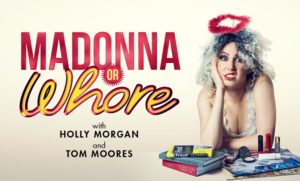
Now, as really this is some deep stuff to be watching, Morgan and Moores turn it on its head; part stand up, part farce, part comedy duo, they are turned into comical overturns helped by home made props and audience participation.
It is for sure that a review cannot do it justice.
Madonna or Whore? is nothing short of brilliant – topical and very important, Morgan and Moores are just hilarious, clever and totally bonkers. This really is the type of work that should be seen by everyone not only for its importance but for its sheer hilarity and clever approach.
 (5 / 5)
(5 / 5)
Review Red Bastard : Lie With Me, The Vault Festival by Hannah Goslin

 (5 / 5)
(5 / 5)
Bouffon : A theatre concept that is unique, niche and rarely seen in contemporary theatre. Red Bastard could easily be said to be the father of this style.
As a student studying performing arts 5 years ago, I was introduced to Red Bastard and fell in love with not only him but Bouffon – a type of theatre where a character who is misshaped and says the things no one should ever say, it is shocking, hilarious and fantastic. Not for those who are too PC!
Lie With Me is Red Bastard’s second show. This time he takes on love, and asks the questions we are all scared to ask and think about – What counts as cheating? What even is love? And pointing out that we all LIE.
Red Bastard uses 3 alter egos – Red Bastard is the devlish and mysterious figure who gets off on our lies, our infidelities, our animal instinct. Eric is the performer – he almost does not agree, he is apologetic and horrified by Red Bastard. And finally a man with no name, who just wants love and to be loved – he’s respectful, giving and rounds up the show with a wonderful soulful ending.
Red Bastard moves across our stage, like a little round devil ; licking his fingers as he enjoys our lies like a delicious cake, miming making sandwich’s, cutting deserts, and filling his evil belly with it. You cannot help but laugh at this but admire his precision in his movements; his known movement of walking and rubbing his misshapen body as he speaks to us is almost like a star struck moment to us fans.
It is unclear how planned and how much improv he uses – he interacts with us but seems to be ahead of us all. This shows true skill as a performer that we know he cannot possibly predict all the infinite options that can come from the audience, but he is so precise and perfect that he takes it in his stride and reacts perfectly every time.
Red Bastard is a hero of mine and he did not disappoint. A well researched performance, he has no qualms, fears or want to not offend, to not tell us what we are thinking, and makes us come away contemplating what life really is, whilst our stomachs hurt from laughing so much.

Hannah Goslin
Review Hamilton by Jonathan Evans
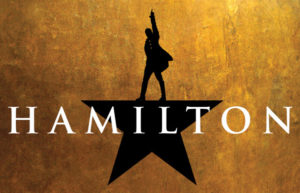
 (5 / 5)
(5 / 5)
Hamilton is a phenomenon. Lin Manauel Miranda’s show about the rise and fall of the founding farther Alexander Hamilton who would be immortalised by having his face on the ten dollar bill is one of the biggest shows to musical theatre in a long time. It’s fan-base has grown and grown and it has conquered America and is now taking on the rest of the world.
The London show at the Victoria Palace Theatre has grabbed and magnificently run with the baton of standard that this show has gathered. From the words on the page, the set, to the performances themselves they bring this show to life with grace and fury.
The opening number sets up almost everything we need to know. From our heroes backstory to where he is when the story stars and even his end.
https://youtu.be/E8_ARd4oKiI
The stage has the floor and rafters so that actors can ascend and descend to signify gain and loss of power. The unique aspect of it is the revolving mechanic of the floor of the stage. It is both technically impressing but also essential to the language of the play.
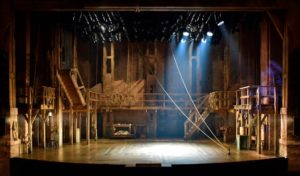
The rotation gives a greater geography to the limited space of the stage, now the actors can continually walk. Also it happens during more key moments so it becomes an expression of Hamilton’s life moments, when he meets someone new or a choice is to be made his world has shifted. It again serves as having Hamilton as the centre while the character and events revolve around him also the ticking of a clock that waits for no one. Along with the unique element they also use the lighting to paint the mood of the scene and represent when a character is isolated. The actors navigate the space expertly with almost nothing out of sync.
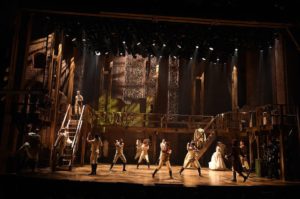
As we all know the founding fathers were all white men and married white women. For historical accuracy this cannot be disputed. However this is a contemporary piece of art so it is not so much interested in being historically accurate but more in spiritually representative of America. The casting for the Hamilton cast is very diverse, having almost everyone of every ethnicity represented on stage. If someone who is curious what Alexander Hamilton really looked like then they have only look it up.
An elements of the performance that there is an argument for being cut (but people would be hounding for blood if it was.) This is the segments with King George, they are the point of view from his perspective as he learns about Americas quest and gaining of independence. Really they don’t need to be there, yet they are so loved and funny they must. His lack of choreography is also immensely amusing, because he is dressed to the ninth all he can really do is stand there but it works by making him seem more uptight.He manages to work in some shoulder movements and he works the crowd greatly. His musical style is more like that of British rock which adds another level of diversity to the show.
The songs carry the narrative and theme. No speaking breaks, all songs, non-stop. The backing musicians play extremely well. The songs themselves area all immensely catchy and will have you repeating a few of them when you leave the theatre. Some of the top favourite are My Shot, Helpless, You’ll Be Back, Burn and others but count on you leaving with a favourite (mine’s Non-Stop).
The play as a whole is divided into two acts. The first is establishing Hamilton himself as well as a few of the others that will play big roles in this story, also about Americas fight for independence. The second act is about dealing with independence and the conflicts they have to deal with become more personal and internal.
The acting from the players is very good. There are many characters in this story and in the second act the actors switch roles to the new characters that are introduced. There is just so much to say about them that it would take up too much of the review, so I’ll just summarise by saying their performance, from the expressions, to the singing is indeed top notch.
The main feats of dancing and choreography come from the background extras. The main players in the scene don’t really bust out many impressive moves, but then again they have many lyrics to remember and sing and if they were doing something more physically taxing then they’d most likely be out of breathe and that wouldn’t be any good. They do indeed do some dancing and hand movements to stop them from becoming dull planks which keeps us looking at them.
Hamilton is the story of the American dream as well as other things and told with modern sensibilities. It is incorrect in a few historical details as others have pointed out, but this is a work of art not an accurate historical account of events. It tells it’s story succinctly through it’s chosen medium of rap with very efficient and fast lyrics being sung and the visuals on-stage from the dancing to the lighting do so many things to draw your eye that you’ll be engaged for the full three hours and then complain that it was over too soon.
Jonathan Evans
Review Incognito, Theatre Through The Telescope, USW by Kevin Johnson
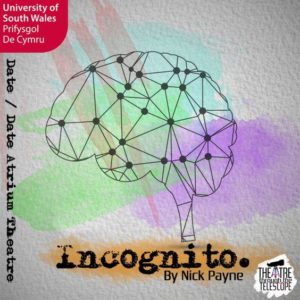
Inspired by the true story of the ‘theft’ of Einstein’s brain by an American pathologist, Incognito weaves together three stories, set in the past and present, involving the workings of the brain it’s effects on people, and the connections it makes, both internally and externally.
Written by Nick Payne, directed by Paul Conway and performed by a cast of ten BA students from the University of South Wales, we veer from the pathologist to a modern neuropsychologist, and a patient with memory problems.
Set in an enclosed space, the actors manage to create an impressive show, with fully fleshed out characters, taking us from London to New Jersey to Kansas. The scenes range from a medical exam of a man with brain damage, to a first date, to a diner, leading us to questions of memory, identity and what makes us who we are.
Henry, the patient, suffers short-term memory loss, yet always remembers his love for Margaret through the years. Evelyn wonders if she’s Einstein’s daughter. Thomas wants to make a scientific breakthrough. Martha wants to start afresh with Patricia. All of them, one way or the other, defined by the workings of the human brain.
All the actors get their chance to shine in a fine ensemble piece. Laura Maggs gives us a sympathetic Margaret who sabotages her own efforts to connect with Patricia, a charming Gabrielle Dunn.
James Lawrence’s Henry is heartbreaking, managing to keep the repetition of ‘Hello my love’ constantly fresh. Kieran McCutcheon keeps Thomas from becoming a cliche mad scientist while clearly showing his desperation, and Charlotte Dolan as his wife Elouise is a fine foil to him.
Hannah Moreno makes Evelyn layered and complex, Lucy Gooding’s Margaret evokes love’s gain and loss, and Shaunie Williams Welsh waitress is earthy and warm. Liam Edmunds is delightfully seedy as the reporter.
Tom Dyer, playing five roles, goes from drama to comedy with ease, and finds the humour in the simplest of lines.
If this young cast is typical of students coming through, then I look forward with great keenness to seeing such quality in the future.
To find out more about BA Theatre and Drama at USW, click here.

Kevin Johnson
Review Mnemonic, Complicité: Theatre Through The Telescope by Kevin Johnson
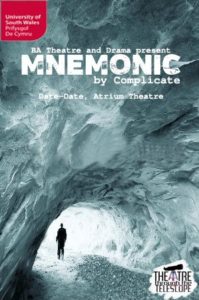
Part of the Theatre Through The Telescope season, a collection of plays sharing the theme of science, this is a work created by the Complicité theatre company.
It’s central premise is memory, it’s fallibility, how we shape it, how it shapes us, and how it connects us to past generations.
Moving from separated lovers in London to a mummified 5,000 year old corpse in Austria, via travellers, tourists and workers, making observations along the way. How today’s citizen was yesterday’s immigrant, and possibly tomorrow’s refugee?
One line resonated most with me, that ‘the biggest discovery of our present is the immensity of our past’. Using a simple leaf and a blindfold, the cast shows us how all our pasts are irretrievably connected, that it’s a mathematical certainty that we are family, not a theory. Yet violence is also our legacy.
In the end, all we have, like the mummy, are scraps and fragments
The cast of ten excitingly bring to life a vast selection of eclectic characters, some recurring, some not, but all moving the narrative along at a fast pace. That they do all this while at the same time acting as stagehands, setting up props for scenes and re-setting them, is pretty damned impressive.
These are the theatre makers of tomorrow, and based on this example, tomorrow is in good hands.

Kevin Johnson
Review Becoming Shades, Chivaree Circus, Vault Festival by Hannah Goslin

 (5 / 5)
(5 / 5)
In the deep dark underground of The Vaults in London, Vault Festival obtains every corner. Lightened by UV and Neon, packed full of people, in rooms that seemingly appear from nowhere – what a perfect place to stage an apocalyptic underworld full of circus extraordinaire.
Becoming Shades is mostly entirely run by women – but these women are fierce. They occupy this expanse of an Underworld, making us stare and gasp in awe at their circus techniques – but not all is what it seems. This is dark, real dark – a feeling of two acrobatics with a grudge; a girl pulled into the chaos and forced to perform; three henchmen and their comical relationships; all run by our ‘ring leader’ – a gas masked mystery, moving almost like an old person but still curious and inhuman-like.
https://vimeo.com/245702028
This promenade performance moves the audiences across the space – our henchmen guiding us with mime and fear – we’re never sure if they will hurt us or play with us. They move us with such ease – the lighting changing and acting as a beacon for where we must go.

The costumes and set are exactly what you would expect – reused material yet with a finesse of circus tradition; everything encompasses this watery, dark underground world.
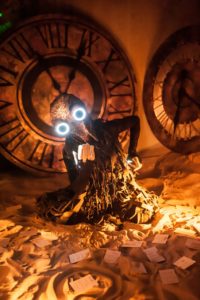
There’s no ‘tud dah’ moments; no smiles; we know we cannot be hurt and we will leave eventually but there’s the 1% that makes you think you’ll be with this group of mischiefs forever.
The stunts are undeniably creative, surprising and inspiring; seeing each muscle in the performer’s bodies move in the light as their sheer strength and flexibility turns around a rope; silks; flaming hoops and so on. And then there are fire breathing, juggling, all to grab your attention and keep you guessing.
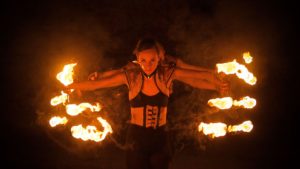
The cast themselves did a great job of constant character; the interval let us stay in the area and they loitered; looking sad and bewildered; listening to the live music which was very necessarily dark, indie and mood enhancing. Or they decided to play with us, invite us to be entertained instead of checking Twitter.
Beyond Shades evokes a little reminder of No Fit State Circus ; energetic, unusual but still with their own take and own identity. Just as No Fit, they are incredible and nothing short of sheer perfection, something like you have never seen before.

Hannah Goslin
Review A Clockwork Orange, Exeter Northcott by Hannah Goslin

 (2 / 5)
(2 / 5)
Unless you have lived under a rock, everyone knows A Clockwork Orange, written by Anthony Burgess and hitting our screens in a feature film in 1971.
The story features violence, rape, theft and a utopian type existence where everyone fears the youth gangs swarming the streets and committing such atrocities. Eventually this becomes too much and ring leader, Alex, is imprisoned for two years until being chosen for an experiment meant to “cure” him.
Not only have I seen the film, but countless stage performances; this story lends itself to easily be customised – a directors heaven in producing their own take on the story.
This time around, the show has been taken on by Exeter University’s Theatre society. They make great headway with staging – with high level stage and props to use, they enable the time period to be stretched and changed, adding to this concept of a utopian world. The costuming is in addition to this; complimenting the time period the story comes from (70’s), again there is creativity with time periods and a huge sense of different empowerment with the use of army uniforms. This story is a fearful one, which we have come close to with societal atrocities spanning across our country, therefore not placing this anywhere specific in time or location makes this relateable to our fears for the future.
The performances themselves were ranging in quality. Thinking of a University Society, it’s understandable and expected that there would be a element of different levels of skill. However you cannot say that no one was not fully in their performance, and all in all showed great professionalism.
My issues with the performance was it felt as if there was a struggle to cut down content and the second half felt rather long. This is a common mistake when starting to bring page to stage and something that can only be enhanced but which most practitioners have fallen to once or twice.
There was an obvious need to try and shock us – rape scenes, nudity, false blood etc. Now I love performances that do this – devised performances that create a sense of surprise and in a taboo fashion is great but difficult with a well renowned story that is known for its taboo content. I only think that to keep the audience, the company should have taken the advice of less is certainly more.
Finally, the performers added a new element to this show – musical numbers. While I commend this bold move, it did not feel as if it worked – a more violent and sweary West Side Story comes to mind. Somehow this did not gel with the production but was a commendable move.
All in all this production of A Clockwork Orange was an interesting take on the original story – paying homage to the main themes of a possible future existence in our society, along with a nod to the original book and film’s time period, the company did well to produce something new yet still recognisable, throwing their all into their characters and doing this with no fear.

Hannah Goslin
Looking ahead in 2018 Culture, Creativity and Change!
In this article we look forward to a range of cultural highlights in 2018. Thanks to all of the creative artists involved for their own personal response.
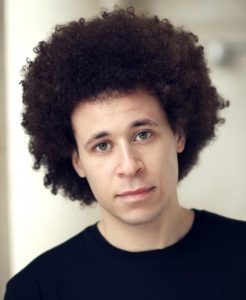
Connor Allen, Actor and Playwright
I would have to say that one cultural highlight for 2018 that I cant wait for is Dennis Kelly’s Girls and Boys at The Royal Court directed by Lyndsey Turner. Last year I had the pleasure of watching Hamlet directed by Lyndsey Turner and it was breathtaking. So her vision partnered with Kelly’s writing can only bring great and spectacular things (hopefully!)

One for me closer to home is to see what brilliant work National Theatre Wales bring out for the anniversary of the NHS.
My personal hope for 2018 is to get my play about homelessness I have been writing, funded and performed. that would be a massive personal achievement for me.

Meredydd Barker, Playwright
I don’t plan because I like to wonder in the morning what I’ll go and see that night, but as far as theatre in 2018 is concerned, Owen Thomas’ The Wood at The Torch, Lisa Parry’s 2023 at Chapter and Maxine Peake in Beckett’s Happy Days at The Royal Exchange; those three in a very crowded field along with hoping for surprises in Edinburgh come August.

In contemporary art – whatever that means – Ragnar Kjartansson is at the National Museum Cardiff with a new performance piece (co-commissioned with Artes Mundi) called The Sky In The Room. It is a piece which will be played by a revolving roster of organists and sounds beautifully bonkers.
At some point this year I will see The Idles live because they want us to, as they say, “dance and laugh and sing in the face of adversity.” 2018 is going to need them and their beautiful clamour.

Rachel Boulton, Artistic Director, Motherlode Theatre
It seems like 2018 is going to be another great year for new theatre in Wales. Having seen a development stage of Cwmni Pluen’s next show, I’m really looking forward to seeing a final production from them this autumn. Pluen has a definitive performance style which I’m always excited to see. They’re also working in collaboration with charities during the development of the piece which I think sets a great precedent for future companies making new work. I also can’t wait to see National Theatre Wales’ Love Letter to the NHS. While the NHS is under siege from; medical companies charging them a fortune for treatment; government cuts; surgery closures; and an all time waiting list high; it’s important more than ever to support and celebrate our National Health Service in face of adversity.

My personal hope for the year is to successfully tour Motherlode’s next production Exodus. The piece was developed in Aberdare with generous support from our long term collaborators and co producers RCT Theatres and will be part of their year long 80th birthday celebrations, which includes lots of new work by exciting artists. Exodus is also supported by Creu Cymru, Bristol Old Vic, Night Out Wales and Chapter, touring to 12 venues across Wales before running in London. Gulp… I just hope we pull it off!”
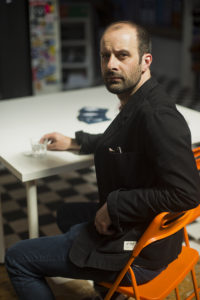
Matthew Bulgo, Actor and Playwright
I’m really looking forward to seeing Louder is Not Always Clearer from Johnny Cotsen in February. I was disappointed to miss the work-in-progress of this as part of Experimentica last year so I’m glad I’ve got a second chance.

Elsewhere, I’m really looking forward to catching The Birthday Party (one of my favourite plays) in the West-end which has a stellar cast including Toby Jones and also The Twilight Zone from American playwright Anne Washburn which is at the Almeida. Later in the year, I’m really looking forward to catching Eyam at Shakespeare’s Globe which has been written by the very talented Matt Hartley and is being directed by Wales’ own Adele Thomas.

Gareth Coles, Voluntary Arts Wales Director / Cyfarwyddwr Celfyddydau Gwirfoddol Cymru
Recently I’ve been losing myself in the acoustic EPs of the guitarist Yvette Young who also writes and performs with the band Covet. She will be releasing a piano EP early this year, and having heard some snippets, I can’t wait to hear the whole thing.
On a personal creative note, I’m hoping to develop my drawing this year. I seem to have spent most of 2017 hurriedly sketching, but having developed the habit of drawing daily, it’s time I started working on some longer and more thoughtful pieces. I have also just started playing the piano again after many years’ hiatus, so I’m hoping my rusty playing will become slightly less objectionable by the end of the year.

Simon Coates, National Theatre Wales’, Head of Creative Development
Jonny Cotsen with Mr and Mrs Clark producing and touring Louder is not Always Clearer, a project I had the pleasure of supporting the development of in its early days with NTW.
Festival of the Voice in June for more incredible vocalists and a no-holds-barred look at the power of the voice. As well as our own NHS70 Festival of course, Theatr Genedlaethol Cymru’s Nyrsys by Bethan Marlow marking the 70th anniversary of the NHS.

The Terra Firma Spring Tour by NDCWales including the mesmeric Tundra by Roy Assaf. EXPERIMENTICA Festival at Chapter will back again for another year of live art from all over the UK and further afield in April.
And finally I am hoping to make it along to Abercych to join one of their experimental Twmpaths with Simon Whitehead and his collaborators.

Geoff Cripps, Board Member, Theatr na Nog, Creu Cymru and musician with Allan y Fan
The Cultural Events in 2018 that I am already booked into and greatly looking forward to seeing starts on Saturday 6th January with a visit to The Old Vic to see Rhys Ifans as Scrooge in the acclaimed production of “A Christmas Carol.” Just a few days later and we are off to the Bristol Old Vic to rendezvous with Emma Rice’s “The Little Match Girl”.
At the end of January I am delighted and privileged to return to Glasgow as one of the 180 delegates to Showcase Scotland – a very important element within the world’s greatest mid-winter music festival. The five days I will spend here will definitely kick away any lingering vestiges of mid-winter blues! Don’t know yet which artists I will see/hear in total but I am pleased that in the festival’s 25th anniversary year the Showcase Scotland partner is Ireland. Still hoping that one year Wales will create something of lasting value like this event which has had such a powerful impact on the development of Scottish Artists in an international setting.
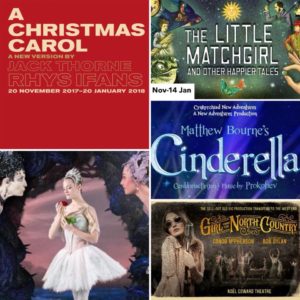
Later in March I will definitely be re-visiting one of my favourite productions of 2017 – The Old Vic’s “Girl From The North Country” – now transferred to the Noel Coward Theatre in the West End. Go see it if you think Bob Dylan is a genius, go and see it if you don’t know what all the fuss is about and marvel at what Conor McPherson has concocted.
Encouraged by my own top management I am looking forward to seeing two inspirational dance productions at the WMC in April from Birmingham Royal Ballet and May from Sir Mathew Bourne’s New Adventures.
I have yet to pick what to see closer to home in the valleys but am looking forward to visiting RCT Theatres, The Borough Theatre and Blackwood Miner’s Institute on several occasions during the year.
My personal hopes for 2018 include doing my best to ensure that Theatr na nÓg builds on the great achievements of 2017, that Creu Cymru continues to be the essential organisation for the theatres and arts centres of Wales and, on a real personal note, that my band Allan Yn Y Fan have our most successful concert ever in Blackwood Miner’s Institute on 28th March!
I am sure that every other contributor will make their feelings known about “Brexit”, “POTUS”, the “Maybot” etc. etc but I am deliberately trying to keep this light-hearted.
Let’s hope that despite everything the Arts In Wales continue to deliver life-changing experiences, uncover nascent talent, connect more deeply with their communities and audiences. Finally I hope that BBC Wales finally delivers a year-round coverage of the Arts In Wales.
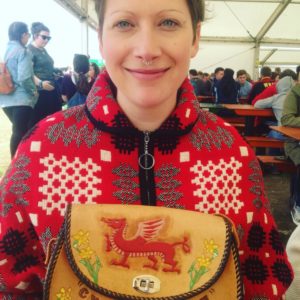
Dr Branwen Davies, Playwright
My Cultural highlights for 2018 so far are:
Theatr Geneaethol’s Y Tad
Pirates of the Carabina’s Relentless Unstoppabble Human Machine at Pontio Bangor January 16th-21st

Dirty Protest’s Lightspeed from Pembroke Dock by Mark Williams touring Wales in April and May
V&A’s Frida Kahlo Making Herself Up exhibition opening in June 2018.
My personal hope is to be continued to be inspired and surprised by writers and artists pushing boundaries and creating work that moves me and reminds me what it is to be human.

Peter Doran, Artistic Director, Torch Theatre Company
On a personal level, I’m really looking forward to directing our next production, The Wood by Owen Thomas; its always exciting to tackle a new piece of writing, one never really knows if it will quite come off as expected or hoped. Giving the success we had with Owen’s last play Grav (shortly to go to New York), we have high hopes but we know that there’s a great deal of hard work in front of us. I’m also working on it with two actors, whom I’ve never directed before (Ifan Huw Dafydd and Gwydion Rhys), so that gives an extra frisson.
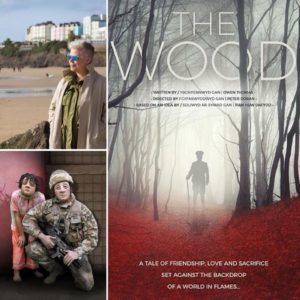
Elsewhere, I always look forward to Vamos coming to the Torch; Vamos are a full mask company who do wonderful work, this season they are touring a piece about the war in Afganistan called A Brave Face, one to look out for. I loved Liverpool Everyman’s repertory season last year and I’ll be interested to see if the second season is as successful – A Clockwork Orange sticks out as a highlight for me.
NTW are coming to Pembrokeshire with The Tide Whisper – theatre in a boat off the Pembrokeshire Coast; you won’t get a better or more dramatic backdrop, let’s hope they compliment each other.
My personal hopes? That the true value of art and culture is appreciated and not seen as the icing on top of the cake. It’s not a commodity that can take it’s stand in the market place and compete; it has to be nurtured, supported, fed – if not, it will wither away and die.

Tom Goddard, Artist and Criw Celf Coordinator
In a time when Netflix is elevated to the role of religion, Shezad Dawood’s Leviathan satisfies our obsession with marathon box set watching, with this ten part film series. First at last year’s Venice Biennale and the series continues now at Mostyn, Llandudno in March.
Cardiff’s James Richards, who represented Wales in Venice last year, will be bringing Music for the Gift back home to Chapter opening at the end of February.
Ragnar Kjartansson, Artes Mundi 6 nominee, will return to Wales to present a brand-new performance piece, The Sky in a Room which will feature a series of revolving local organists performing the 1959 hit song “Il Cielo In Una Stanza” (The Sky in a Room) on the 1774 Sir Watkins Williams Wynn organ.

Chapter’s Experimentica, will roll into town again in April and is always guaranteed to raise a smile and challenge in equal measure with a real range of refreshing voices and ideas from the world of live art. NS Harsha, Artes Mundi 3 winner, will return to Wales at Glynn Vivian in Summer 2018 presenting screening printing, installation, sculpture and drawings.
Glynn Vivian will also be opening late once a month offering performance, music, workshops as well as curatorial opportunities for young people.
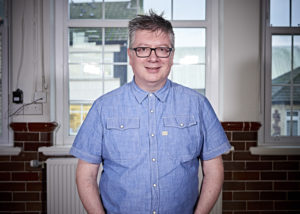
Simon Harris, Playwright and Director of Lucid
It would be a bit matey of me to select 2018 highlights from Wales, so the two things outside of Wales that I’d really like to see are Chris Goode’s staging of Derek Jarman’s Jubilee which has been at the Royal Exchange n Manchester and is going to the Lyric Hammersmith. Because punk’s not dead. The other is Dead Centre’s new production at the Schaubuhne of Shakespeare’s Last Play – partly to see the work and partly to go to Berlin as I’ve never been there and I’d like to go before the world ends.

I’m a little overwhelmed by how far away we are from how I’d like things to be in 2018. There’s so much to do in so many areas, it would be easy to give in and give up. But I’m drawn to some of the determined spirits out there and so my main hope for the sector is that we move to a more productive, more innovative, less hierarchical approach to making work. I would like to see some of the fake differences between Arts Council Wales portfolio and the remaining group of artists and companies done away with. I’d like to see individuals and companies allowed to apply for larger sums and for more extended periods of work, instead of one-off projects. Most of all I’d like to some vision that can lead to the release of the amazing potential of artists in Wales and their work. Oh, and a bit more honest dialogue and a lot less self-referential, self-congratulatory bulls**t.
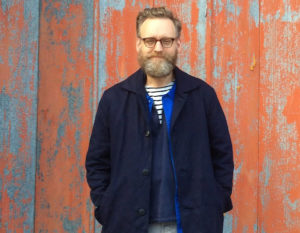
Steffan Jones-Hughes, Director Oriel Davies
There’s so much exciting art to see in 2018!
January sees Nova open at Aberystwyth Arts Centre. An exciting exhibition of young contemporary artists originated by the Royal Cambrian Academy. Look out for inaugural award winner Paul Eastwood, and also Catrin Menai, Rory Duckhouse, and AJ Stockwell. Aberystwyth Arts Centre- 25.1-1.4 2018
February I can’t wait to see The Sky in a Room by Icelandic Artist, Ragnar Kjartansson. The exciting performance will see a series of revolving organists performing the 1959 hit song “Il Cielo In Una Stanza” (The Sky in a Room) on the 1774 Sir Watkins Williams Wynn organ, and will run from 3 February to 11 March at National Museum Cardiff.
Photographer Mike Perry’s exhibition Land/Sea opens at Mostyn, Llandudno in March and the Ffotogallery tour continues to Aberystwyth Arts Centre.
April: the moment everyone in Wrexham has been waiting for: The opening of Tŷ Pawb, the new galleries and market and cultural centre with Dydd Llun Pawb and the launch of “Is this Planet Earth?” curated by Angela Kingston and touring later in the year to Aberystwyth Arts Centre.
June sees The Oriel Davies Open inviting artists from Wales, UK and internationally through Open Call to show work. I’m on the selection panel along with Jane Simpson (artist & Director Galerie Simpson), Matthew Collings (writer and curator), Sacha Craddack (curator and writer. TBC), and Alex Boyd Jones, Curator OD. Oriel Davies Open 2018 23 June – 5 September.
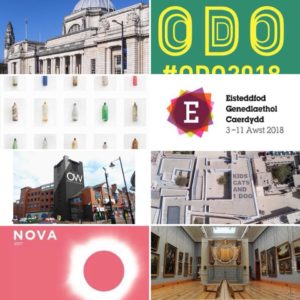
In July Liverpool Biennial is back for a tenth edition with Beautiful World, where are you? Artists and audiences can reflect on a world of social, political and economic turmoil. Liverpool Biennial 2018 Beautiful world, where are you? 14 July – 28 October
The first week of August is always set aside for Y Lle Celf at The Eisteddfod Genedlaethol Cymru held this year at the Senedd, in Cardiff Bay
September at Oriel Davies Legion Projects (artist-curators Matthew Hughes and Una Hellewould) will explore witchcraft through curation of a group exhibition, inviting a diverse set of contemporary artistic practices to respond to key ideas around witchcraft.
Witchcraft project Oriel Davies 15 September – 7 November
October sees the opening of Artes Mundi 8 at the National Museum in Cardiff
My personal hopes are that 2018 will be a time of unleashing potential, harnessing prosperity and celebrating the power of community within society.

Paul Kaynes, Chief Executive Officer, National Dance Company Wales
Firstly the home team: NDCW are about to set off on our long Spring tour taking in all of Wales, the UK, Austria and Germany with works by Resident Choreographer Caroline Finn (in Cardiff you have another chance to see her beautiful, haunting FOLK) and the mesmerising Tundra by Marcos Morau – already an international hit. Later this year watch out for a contemporary dance-opera we’re presenting with Music Theatre Wales in October/November. It’s a beautiful work.
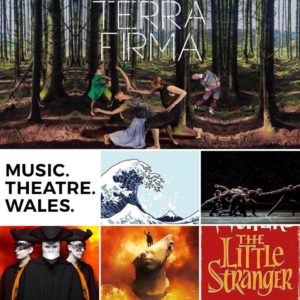
But what else? Artist James Richards’ mysterious work for the Venice Biennale last year is coming to Chapter in February and I’m interested in seeing again his exploration of hidden gay histories. Our former dancer and choreographer, Matteo Marfoglia, makes rich work of personal histories full of emotion and surprise, so I’ll be there for any performances. And I’ve already got my tickets for the RSC’s Cicero plays (Imperium) based on Robert Harris’s wonderful books, for WNO’s Don Giovanni in February and BBC NOW’s concert of work by Messiaen and Debussy in March. I’ll have to travel to London to see Ballet BC’s Emily Molnar new work based on works by Emily Dickinson and Jeanette Winterson: sounds intriguing. There’s a new Kate Atkinson novel coming up (always worth it) and a film adaptation of Sarah Waters’ creepy A Little Stranger. 2018 seems like it’s going to be a great year, at least culturally! Politically, all bets are off.

Angharad Lee, Theatre Director, Educator, Facilitator and Lecturer.
Cultural Highlights 2018:
2018 London International Mime Festival. Anything and everything that is shown here. Go go go…..
Personal hopes for 2018:
To finally see every organisation in Wales tackling all barriers to access, rather than relying on one or two organisations. Saying this, we have to upskill those creating the work at grassroots level for this to be achievable, so I hope to see lots of money being ploughed into this.
I hope my production of the musical The Last 5 Years comes to fruition and tours Wales Autumn 2018 as this has access at its heart and supports BSL as a culture.

I look forward to seeing our Opera Bites event expanding a little as well as some exciting developments with our 10 Minute Musicals project come to fruition. We have a sharing of this work at Millennium Centre, February 25th, Blackwood Miners Institute, February 27th and then we are sharing it at Focus Wales 2018 which is hugely exciting for this project and all the artists involved.
There is a piece I started to develop last year with Eddie Ladd based on Rapture by Carol Ann Duffy which we hope to pick up this year. It’s a piece very dear to me therefore I hope we make this work for us. Building in this there may be another exciting collaboration with Eddie in the pipeline. Watch this space. Our work compliments each other wonderfully.
I hope to see more of my daughter this year, drink less rose wine and get back into the gym at more regular intervals. I am also hoping to renovate my kitchen and become a better cook!! I have also vowed to explore the landscape I live within this year and reconnecting with nature a little.
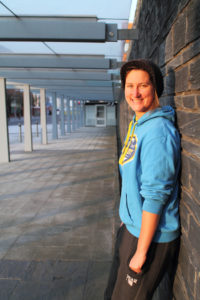
Bethan Marlow, Writer
2018 feels like a fresh year. There’s a lot of courage in the air, people are standing up and shouting out, dirty secrets are no longer protected and new manifestos are being drawn. I’m crossing all my fingers that this also means that we’ll see fresh and courageous cultural activity all over Wales in all languages.
Some things are already drawing my attention like Mr and Mrs Clark’s “Louder is Not Always Clearer” with Johnny Cotsen
NTW’s Sisters and Common Wealth’s “Radical Acts”. I’m excited that this year promises a lot of developmental support for creatives both new and established with National Theatre Wales’ “Creative Development” and Theatr Genedlaethol’s “Theatr Gen Creu”. And speaking of change, I’m very excited to visit the Eisteddfod Genedlaethol this year with it’s new experiment of having no boundaries which will hopefully create a welcoming and inclusive environment for all of us living in Wales.
I hope we all, and I’m very much including myself here, have the courage to dig deep and create what we need and want to create this year. Not what we think people will go and see or what we think will tick funding boxes but what our guts are screaming for us to make.

David Mercatali, Associate Director, Sherman Theatre
I am hugely excited to be working with the fantastic Welsh writer Katherine Chandler and the next generation of acting talent on the world premiere of Buddy. The play is part of NEW:2018 and is a co-production between RWCMD and Sherman Theatre. My wish for the New Year would be for anyone living in Cardiff who hasn’t been to the theatre yet to give it a go!
My wish for the New Year would be for anyone living in Cardiff who hasn’t been to the theatre yet to give it a go!

Michelle McTernan Actor and Playwright
I’m looking forward to so many cultural delights during 2018. It starts with an R&D for my first play “Bruises” which won the Script Slam at Pontardawe Arts Centre. Then my husband Christian Patterson opens at The Donmar Warehouse in “The Way of the World”. So I’ll be off to London where I hope to take in a few more plays. Here, I’m also looking forward to seeing The Wood by Owen Thomas, Nye and Jenny by Meredydd Barker and Dublin Carol by Conor McPherson at Sherman Theatre.
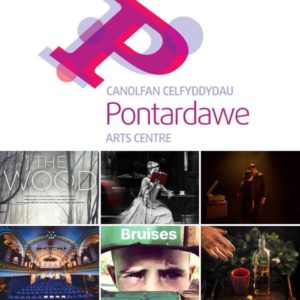
My personal hopes for 2018; In light of the funding threats to my local arts centre at Pontardawe, I hope that the people who make these detrimental decisions recognise the importance of the arts and their effect on our wellbeing. I hope that communities begin to make more use of all local arts centres and that artists and creatives have the freedom and funding to encourage and inspire those that are blind to its relevance in our society today.

Sharon Morgan, Actor and Writer
Dwi’n edrych ymlaen i weld Y Tad, cynhyrchiad diweddaraf y Theatr Genedlaethol gan Florian Zeller, cyfieithiad Geraint Lovgreen ( Ar daith 21 Chwef-16 Mawrth) gyda Dyfan Roberts yn y brif rhan. Cychwynnodd Dyfan a minnau’n gyrfaoedd gyda’n gilydd nol yn 1970! Hefyd cynhyrchiad Theatr Pena – Women of Flowers gan Sion Eirian ar ol Saunders Lewis (Ar daith 1 Chwef-9 Mawrth) gyda’r anhygoel Sara Lloyd Gregory fel Blodeuwedd. Dwi am fentro i Pafiliwn Bont ar gyfer ail-gread sinematig a barddonol Mike Pearson a Mike Brookes wrth iddyn nhw gychwyn ar brosiect tair blynedd gyda NTW o dan y teitl The Storm Cycle gyda Nothing Remains The Same (15-17 Chwef), a mae nhw’n addo seddau dan do! A tan gwyllt! Mewn cynhyrchiad amserol am ieithoedd lleiafrifol bydd Theatr Gwalia yn cyflwyno Inheriting The Gods Carmen Stephens am berthynas rhwng bachgen ifainc o lwyth y Wampanoag a Cymraes, a mae’r anhygoel Dirty Protest yn dathlu ei penblwyddd yn ddeg oed gyda drama Mark Williams Lightspeed from Pembroke Dock(Ar daith 4 Ebrill- 5 Fai)
Mae son bod cynhyrchiadau newydd ar y gweill gan Mercury, Neontopia a Triongl, a gobeithio bydd Na’Nog yn atgyfodi Nye and Jennie gan i mi ei fethu yn y Metropole yn Abertileri,a pwy a wyr pa ddanteithion daw i’n diddanu pan ddaw’r Eisteddfod i Gaerdydd ym mis Awst.
O’m rhan fy hun mae gen i brosiectau gyda’r Theatr Genedlaethol, Na’Nog, Theatrau RCT a Canoe a dwi’n gobeithio bydd fy sioe un menyw am Rachel Roberts (Yn Gymraeg) yn digwydd o’r diwedd!

I am looking forward to Theatr Genedlaethol’s latest production Y Tad ( Le Pere) by Florian Zeller trans. Geraint Lovgreen (Touring 21 Feb- 16 March) with Dyfan Roberts as the father. Dyfan and I began our careers together back in 1970! Also Theatr Pena’s production Women of Flowers by Sion Eirian after Saunders Lewis (Touring 1Feb-9 March) with the amazing Sara Lloyd Gregory as Blodeuwedd. I shall venture to Pontrhydfendigaid for a poetic and cinematic recreation by Mike Pearson and Mike Brookes as they embark on a three year project with NTW under the title The Storm Cycle with Nothing Remains The Same (15-17 Feb) and they promise seating- indoors! And fireworks! In a timely production about minority languages Theatr Gwalia presents Inheriting The Gods by Carmen Stephens about a relationship between a young man from the Wampanoag tribe and a young Welsh Woman and is touring Feb 26-March 24. The amazing Dirty Protest celebrate their tenth birthday with Mark Williams’ play Lightspeed from Pembroke Dock (Touring 4 April-5 May).
I hear that Mercury, Neontopia and Triongl are preparing exciting things and I hope Na’Nog will revive Nye and Jennie as I missed it at the Metropole in Abertillery, and who knows what delicacies the Eisteddfod will bring when it comes to Cardiff in August!
I have writing and performing projects with Theatr Genedlaethol, Na’Nog, RCT Theatres and Canoe and I really hope my one woman show about Rachel Roberts (in Welsh) will happen this year!

Catherine Paskell, Independent Theatre Director
I’m looking forward to loads of new original performance work happening in Wales this year, but if I had to pick only two, I would choose:
Jordan Brookes Body Of Work at Chapter on 2 June. I saw this show in Edinburgh, and Jordan was nominated for the 2017 Last Minute.Com Edinburgh Comedy Award for best show. That’s what the Perrier Award is now called, so it’s a pretty big deal and this was a pretty awesome show. It was one of the best comedy shows I saw in Edinburgh last year when Dirty Protest was there with Sugar Baby. I love Jordan’s comedy – I first saw him when he was living in Cardiff a few years ago and it was fantastic to see his work get the recognition he deserves. He’s on the performance art-end of comedy (but without being up its arse) and he’s one of my favourite weirdos.

Also, I really cannot wait for Split Britches’ Unexploded Ordances at the Wales Millenium Centre for a week this March. Peggy Shaw is a world renowned artist and I saw her show with Clod Ensemble Must: The Inside Story ten years ago at the Edinburgh Fringe. It made an impact on me then as she transfixed a Victorian anatomy theatre with a raw story full of poetry and heart and pain and medicine and art. It’s a real privilege for us to see artists of this calibre creating original work in Wales and this experience will be a must see, or rather as it’s interactive art: a “must do”.

Rachel Pedley Miller, Artistic Director, Avant Cymru
In 2018 Avant Cymru are planning a busy year with Forget Me Not in January and Blue Scar in the summer.
We are working with Rufus Mufasa on her album launch on the 16th of January. Looking forward to working with Rufus and Unity further on Welsh Hip Hop projects.
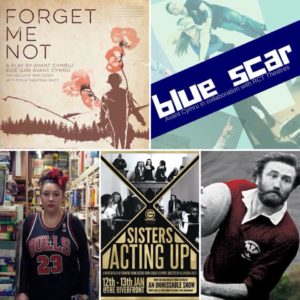
We are also excited to see Sisters Acting Up at the Riverfront this month and Grav at the Sherman Theatre in February.
We are really excited that NTW have launched their new creative development strands, we also are excited to see ehat the NH70 project has to offer. So much is happening in Wales and we are excited to be a part of it. Bring on 2018!

Jac Ifan Moore, Director and Co-Director of Powderhouse
Theatre
Dublin Carol – Sherman Theatre
Coming up in a few weeks at the Sherman. Connor McPherson, killer cast and directed by Matthew Xia. Come on, what more d’you want?
All But Gone – The Other Room
I’m really excited to see what Dan Jones will do now that he’s at the helm of The Other Room. This will be his first production as AD, and it’s a chance to see how he’s going to put his mark on that ambitious company.

Also…
Literally anything that’s on in London International Mime Festival, 10 Jan – 3 Feb, which for my money os one of the best times of year for theatre (don’t be put off by notions of striped t-shirts and glass boxes). Particularly looking forward to Trygve Wakenshaw’s Different Party.
Book
Tribe – Sebastian Junger
Collection of essays that span history, autobiography, anthropology and psychology. What we can learn from tribal societies, what we’ve lost, and why in the modern world we’re still craving companionship and meaning.Film
The Shape of Water – Dir. Guillermo del Toro
Guillermo del Toro’s latest film gets its UK release in February, and I’m looking forward to his particular mix of strangeness. Set to the bleak backdrop of 1960’s Baltimore, it’s apparently a love story between a mute woman and a water god. Yes please.

Lucy Owen, Journalist and writer
I’m looking forward to the Cardiff Kids Literature Festival in April this year. There will be loads of events going on and it’s a great chance to meet authors and illustrators and inspire children to pick up a book.
I am super excited that a book I’ve written for 6 – 8 year olds will be published in September too. It’s called ‘The Sea House’ and I’m really hoping children will love all the characters, particularly my favourite – a brave, sparkly little fish called Fabulous!

Marc Rees Creator and curator of installation and performance
You might have seen my crestfallen face captured on the news when it was announced that Swansea didn’t win the UK City of Culture crown for 2021? Perhaps if we’d gone with the abbreviated SUKCOC ( Swansea UK City Of Culture ) it might have been a different story?I really did think that it was Swansea’s time to shine and to quote the city’s very own big haired 80’s pop icon … we could have turned it around . However there are still exciting plans afoot and one that is very close to my heart is still under wraps till the end of January but I want to mention it as it’s certainly something that I’m really looking forward to getting my teeth into in 2018.
Essentially it’s an immersive Requiem that will kickstart the Swansea International Festival 2018 – written by a twice Oscar nominated composer with a libretto by a BAFTA Cymru winning writer, sung by a world renowned choir and with a wrap around narrative led by the formidable force that is Eddie Ladd. Watch this camouflaged space.
Details will be announced on 26.01.18 via
https://www.nowthehero.wales

Alexandria Riley Actress
For 2018 I’m very much looking forward to hearing more cultural stories being told by people of a diverse background. Great things are happening already but there’s still such a way to go. ‘Fio’ are doing some amazing work right now providing opportunities for BAME actors, writers and directors to showcase work and are providing a great accessible outlet.

I’m involved in TWO amazing plays with full diverse teams this year. One of them which tells a story from voices we don’t often hear from. I am working with phenomenal actors all from diverse backgrounds and I cannot wait! The plays are wonderful and I’m really honoured to be a part of it all! The theatres we are performing in are equally brilliant! Wales is a place of character, diversity and rich culture. So I look forward to us continuing to move forward within the arts and really show what we are made of.

Keiron Self, Actor and Playwright
I’m very much looking forward to Light Speed from Pembroke Dock, a family friendly and Star Wars friendly theatre show from Dirty Protest as part of their 10th anniversary. I have been lucky enough to have a few pieces perfomed by them and their stalwart crew and have a soft spot in my heart for all involved. I also saw an Rand D of the show and it touched a nostalgic string in my heart, it being about fathers and sons and a certain sic-fi film – essentially a taste of my youth.
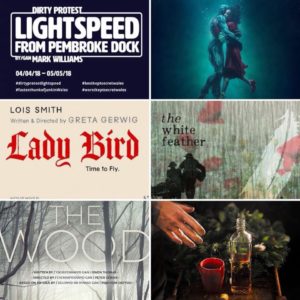
I’m also looking forward to films coming out in February The Shape of Water Guillermo Del Toro’s new fantasy masterpiece about a love affair between a woman and a Black Lagoon-esque creature in Cold War America. I’m a great fan of Del Toro, especially Pan’s Labyrinth, and this ranks right up there next to them. Also in February Lady Bird is a film from Greta Gerwig, a fantastic indie actress making her directorial debut with a well observed coming of age talk between a mother and a daughter starring Saoirse Ronan and Laurie Metcalf.
Looking forward to The Dublin Carol at The Sherman and The Wood from Owen Thomas about Mametz, my play The White Feather also about World War One is being restaged by Theatr na nÓg in the Autumn so I’m obviously and selfishly excited about that too. There are many more things to get excited about of course, here’s hoping 2018 provides an exciting buzzy year for theatre and the arts throughout Wales.
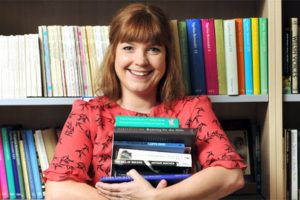
Lleucu Siencyn, Chief Executive, Literature Wales
I’m very much looking forward to a bumper year of culture in 2018. Many people interested in the arts in Wales will already be filling up their diaries.
One of the events I’m especially looking forward to is the National Eisteddfod (3-11 August, Cardiff), as it takes place this year right outside my office window in Cardiff Bay. For the first time in decades, the “Maes” (the festival site) will not be held in a field, and visitors will be able to come in and out as they chose, paying for each event individually. The “no-fence” Eisteddfod offers exciting opportunities to try out new activities, appealing to a wide range of audiences and celebrating the best of Welsh culture in all its forms.
For a relatively small country, Wales punches well above its weight in terms of literature festivals. As well as the world-renowned Hay Festival (24 May – 3 June), many more have appeared in recent years, including the excellent Cardiff Children’s Literature Festival (21-29 April) and the Cardiff Book Festival (7-9 September 2018). I’m particularly looking forward to the newest addition to the calendar, the Seren Poetry Festival at the Cornerstone building in Cardiff (16-18 February).

But there’s plenty to do outside the Capital, and throughout the year you’ll find literature festivals in Laugharne (6-8 April), Llandeilo (27-29 April), Wrexham (Carnival of Words 21-28 April), Llansteffan (7-10 June), Caernarfon (Gŵyl Arall – July), Penarth (July), Caerleon (Lit on the Lawn – July), Hawarden (Gladfest – September) and Cardigan (Gŵyl y Cynhaeaf – October) – to name but a few! 2018 also sees the return and 25th anniversary of the Beyond the Border Storytelling Festival.
Pembrokeshire should take the prize for being the most bountiful county, with literature festivals in Solva (The Edge Festival – 2-5 August), Llangwm (10-12 August) and Rhosygilwen (PENfro Book Festival – September). These festivals would not take place without the dedicated efforts of community activists who believe in bringing people together and sharing a love for words. And the success of many depend on their brilliant local independent book shops.

If your dream is to take part in one of these festivals as a featured writer one day, then you should consider booking on one of the courses at Tŷ Newydd Writing Centre: www.tynewydd.wales. The many highlights include a Creative Writing for Welsh Learners course (16-18 March with Bethan Gwanas and Eilir Jones), Songs and Lyric Writing (9-14 April with Willy Russell and Stewart Henderson), Poetry: Writing about Life (20-25 August with Lemn Sissay, Sophie McKeand and Zoë Skoulding) and Writing a Novel (24-28 September with Louise de Bernière and Wales Book of the Year winner Alys Conran). There is something for everyone this year at this very special place.

I’m looking forward to seeing the completion of the epic 50ft mural by artist Pete Fowler on the iconic Water Tower at Cardiff Central Station. Inspired by the stories of the Mabinogi, the mural is part of the Weird and Wonderful Wales project by Literature Wales and Cadw. The work began before Christmas, but was suspended because of bad weather. The work will continue soon and remain in place throughout 2018, when visitors from all across the globe will see it when they visit Cardiff for events such as the Volvo Ocean Race as part of Year of the Sea.
The Wales Book of the Year award is set to be another great event this year, with the ceremony scheduled to take place in the summer. Announcements will be made in March – so keep an eye out on Literature Wales’ website for details. In the meantime, I was thrilled to see that last year’s winner Pigeon (Parthian Books) by Alys Conran, is being serialised in the Western Mail. Also, the Roland Mathias Poetry Evening will take place on 23 February at The Muse, Brecon, featuring John Freeman, winner of last year’s Wales Book of the Year Roland Mathias Poetry Award, with Jonathan Edwards chairing the event.

Last year the National Poet of Wales, Ifor ap Glyn, with funding from Welsh Government and support by Cymru’n Cofio Wales Remembers (1914-1918), created and toured a multi-lingual multi-media show on poet Hedd Wyn called Y Gadair Wag/ The Empty Chair, directed by Ian Rowlands. It premiered at Yr Ysgwrn, the poet’s home at Trawsfynydd which recently opened as a visitor’s centre. By popular demand, the hope is to tour more extensively in 2018, taking in locations throughout Wales, as well as the UK and Ireland. 2018 will see the announcement by Literature Wales of a new Young People’s Laureate, as Sophie McKeand’s hugely successful two-year stint comes to an end in spring.
2018 marks 70 years since the creation of the NHS, which was established by the great Welsh politician and orator Aneurin Bevan. It’s worth keeping an eye out for cultural celebrations of this significant milestone, including a series of productions throughout Wales by the two national theatre companies, Theatr Genedlaethol Cymru and National Theatre Wales.
In other art-forms, I’m looking forward to the return of Festival of the Voice to the Wales Millennium Centre (7-17 June), the Urdd Eisteddfod celebration of youth culture at Builth Wells (28 May – 2 June), the Swansea International Festival (October 2018) and the international art prize Artes Mundi at National Museum Wales (from 27 October). National Dance Company Wales’ Terra Firma tour takes place in Spring and will be well worth a look. Last year I very much enjoyed the collaborative concerts between the orchestras of WNO and BBC NOW, and I hope to catch a few this year as well. I can also highly recommend Rungano Nyoni’s debut award-winning film funded by Ffilm Cymru Wales, I Am Not A Witch, which will be out on DVD in February.
Like many others, I was very disappointed that Wales missed out on qualifying for the 2018 FIFA World Cup, having enjoyed myself immensely in France in 2016. However, this year I can kick back, enjoy the games relatively stress-free, and pick a couple of nice countries to support. Come on Iceland!

Alastair Sill, Audio Describer for Theatre
I’m really looking forward to watching Owen Thomas’ new play, The Wood by The Torch Theatre. The Wood is inspired by a true story and commemorates the centenary of World War I. Yes, I can’t wait for that one. Another highlight has to be the Festival of Voice between 7th June and 17th June, at locations around Cardiff, created by the Wales Millennium Centre. I really want to try and get down to The Other Room this year because there’s nothing else like it in Cardiff. And anything by Gagglebabble is always fantastic!
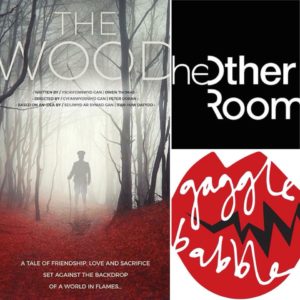
Then personally first of all, I hope I have a happy, healthy and fun year with my two boys and girlfriend. Second, I hope York City FC find promotion to the National League, the first step back to the football league. And last, I hope to record lots of funny little anecdotes from my two boys and write a children’s story inspired by their unique craziness!

Jennifer Ruth Sturt, Assistant Producer, Wales Millennium Centre
Thinking ahead to what 2018 has in store is at once terrifying and overwhelmingly exciting. This year is set to be full on, but hugely inspiring year for us at the Centre. With the launch of two new seasons of programmed work in the Weston Studio and ffresh alongside the return of our biannual international arts festival, Festival of Voice. This year, we’re creating a number of co-productions with some incredible Welsh artists and companies and I’m really proud to be part of the team helping to make them happen. As Cardiff embraces it’s title of Music City, the in-house Festival of Voice team have created a programme of work that really celebrates voice in all it’s guises and alongside an ambitious Creative Learning programme allows us to explore the positive impact of collective singing and creative expression. With just six months to go, I can’t wait for what this year’s festival has in store.

Personally, I’m looking forward to many more adventures in 2018 with plans to travel to New Zealand and Canada, see my best friend get married and all being well, get back out on the road and finally get a half marathon under my belt- fingers crossed.

Geinor Styles, Artistic Director, Theatr na nÓg
My cultural highlights would be anything Theatr na nÓg does – obvs… and also the things I am looking forward to seeing and then probably missing because I’ve double booked myself or completely forgotten they were on…
So if someone can remind me then that would be great…
First up is to see the genius choreographer Matthew Bourne’s Cinderella at Wales Millennium Centre in April, he is without doubt the best storyteller you will see in any medium – IMHO.
The second show for me will be the hugely ambitious adaptation of Patrick Ness’s award-winning children’s novel A Monster Calls which will be brought to life at the Bristol Old Vic (31 May – 16 June) by the incredible talented director Sally Cookson. The film broke my heart, so I cannot wait to see it live on stage.
Then the show I will definitely want to see before it heads off to New York, because I missed it the first couple of times round is Grav, an amazing achievement for a theatre company in far west Wales – The Torch to get it to the stage in New York after sell out shows here in Wales and Edinburgh. Congratulations to the creative team for taking a true Welsh hero and exporting it far and wide.
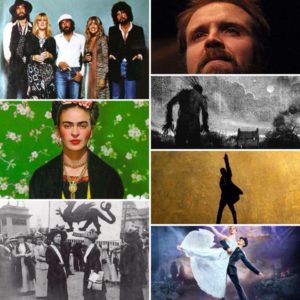
Even though I hate overhyped shows, I must see Hamilton this year. I think the story is incredible and an important one to hear and see in this strange uncertain time. – even though he did the music to Moana!
The Frida Kahlo is a definite must see at the V&A exhibition in London. If I miss this then Coco by Pixar will surely satisfy my Kahlo obsession (yes, you heard it here first)
There will also be a Suffragette exhibition at Swansea Museum to celebrate 100 years of the Women getting to vote. So much has been accomplished and also so much more work to do.
I also hear that Fleetwood Mac are going to tour this year specially for my birthday, so be rude not to!
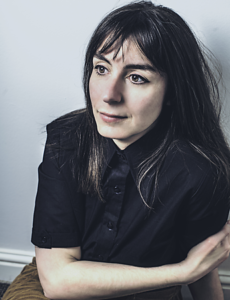
Adele Thomas, Director
The play I’m most looking forward to in 2018 is John by Annie Baker, in a new production at the National Theatre. Annie is probably our greatest living dramatist. She writes with a delicacy and a humanity that make Checkhov look positively cartoonish. Her plays The Flick and Circle Mirror Transformation are amongst my favourite evenings in the theatre, and James McDonald (who directed Circle Mirror Transformation) is directing John, which makes it doubly exciting. I can’t tell you anything about what the play’s about.
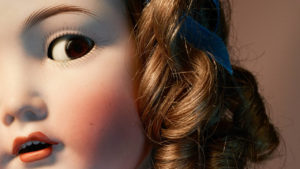
My New Years Resolution is “Avoid the Algorithm”. So much internet noise and being in the industry means that by the time you’ve read the endless marketing and faced the constant stream of twitter criticism you go into the theatre too equipped to watch the play. Imagine being in the first audience for Macbeth or The Cherry Orchard or Blasted or Machinal. You would be entering the auditorium with true openness. As an audience member you might be shocked or bored or moved to tears, but your experience would be an truly honest one, a direct and unadulterated relationship between you and the play. What a gorgeous idea

Sami Thorpe, co-founder Elbow Room Theatre Company and BSL Interpreter
Sami shares her thoughts in BSL in the video below
There is so much to look forward to in 2018. I cannot wait to see Jonny Cotsen’s ‘Louder is Not Always Clearer’, it’s so important to see diverse stories on the stage and, as someone who has been involved with the Deaf community for a number of years, I’m very excited by it. I’m also looking forward to the drag acts coming to Cardiff this year, especially Klub Kids’ ‘The Twisted Circus’, which I shall be fangirling all over!

My personal hope for 2018 is that as an industry we work together to continue to diversify our audiences, sharing ideas and good practice is key. Be brave, take risks, learn and grow.

Rachel Trezise, Novelist and Playwright
I’m really looking forward to seeing Dublin Carol at the Sherman studio in early February and also The Laugharne Weekend in early April and obviously I’m very excited about the new Manics’ album, Resistance is Futile, due in April. I’m one of the judges for the International Dylan Thomas Prize this year so I’m looking forward to reading lots of new fiction.

More personally I hope to make some good progress on the house I’ve been trying to build for almost two years so that I get a functional writing space back by the end of the year!

Tom Wentworth, Playwright
2018 looks set to be an exciting year. Currently I’m looking forward to two exciting pieces in Wales. Jonny Cotsen’s Louder Is Not Always Clearer – I went to an early sharing and so it will be fascinating to see how it has developed. Also Kaite O’Reilly, Sara Beer and Philip Zarrilli’s collaboration richard III redux [or] ‘Sara Beer [is/not] richard III’ – it sounds as though it will be the most amazing piece performed by one of Wales’ finest actors. Further afield I can’t wait for Simon Longman’s Gundog at the Royal Court. Simon was my mentor and has become a friend so it’s especially exciting to see his work on a big stage.
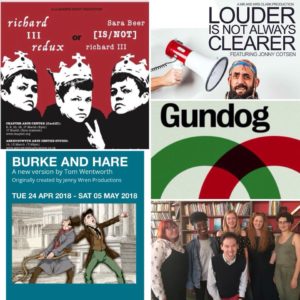
Personally, I’m looking forward to my new version of Burke and Hare being performed at Newbury’s Watermill Theatre before heading off around Berkshire on tour during April/May; plus I have a short reading at The Bush Theatre in London in March as the culmination of a year on their Emerging Writers’ Group plus who knows? (I’d also like some sleep in 2018 too!)
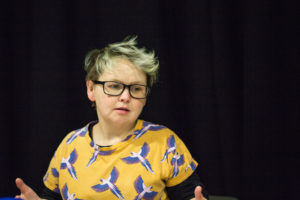
Nickie Miles-Wildin, RTYDS, Resident Assistant Director, Manchester Royal Exchange Theatre
I’m sat at my desk at The Royal Exchange Theatre and there’s so much that I’m looking forward to this year. Being Resident Assistant Director in this amazing building is opening up many great opportunities for me. My highlights are Frankenstein directed by Matthew Xia. 200 years after its publication in January 2018 Matthew is directing a new version by April De Angelis – a writer whose work I enjoy. (Playhouse Creatures is brilliant) Being assistant director on this show I am already in the depths of research and know that the cast is going to truly bring the story to life on our stage.

I’m also looking forward to working with the Young Company up here on their production of Mix Tape. Working closely with Matt Hassall – Programme Leader for the Young Company and composer James Frewer, Manchester will be given its own mix tape.
In the summer I can’t wait to be my alter ego Beryl as I tour a handful of festivals with Bingo Lingo alongside my co-star Daryl and his alter ego Cyril. It’s Bingo on a Paralympic Scale. The Without Walls festivals are an absolute joy to be at and to discover new work.
For me 2018 will be one of exciting creative work indoors at the theatre and a summer of amazing interactive playful outdoor work.
And Deaf actor Nadia Nadarajah being part of the new ensemble company at the Globe. Hopefully we’ll see more Deaf and Disabled creatives leading the way.

Matthew Xia, Director
I’m really looking forward to making some work across England and Wales this year. I’m starting with Dublin Carol – the Conor McPherson play about an alcoholic Undertaker being confronted with the life he has lived, and the others he has broken. It’s playing at Sherman Theatre in Cardiff from the 5th of February for two weeks. I then head up to the Manchester Royal Exchange to make a brand new Frankenstein adapted for the stage by April de’Angelis before directing the premier of the Alfred Fagon Award winning play Shebeen by Nottingham writer Mufaro Makubika. The show, starring Karl Collins will be presented at the Nottingham Playhouse and Theatre Royal Stratford East in June.

As far as things on my radar this year I’m of course hoping to catch Hamilton at some point – although not at those prices. I’m hugely excited to see what seasons of work are presented by the new Artistic Directors including Kwame Kwei-Amah at the Young Vic , Nadia Fall at Stratford East and Justin Audibert at the Unicorn. I’m very excited to see Maxine Peak play Winnie in Happy Days directed by one of my favourite directors and humans, Sarah Frankcom at the Manchester Royal Exchange. I’m also thrilled that Roy Alexander Weise is presenting work at the National with Nine Nights. Other theatres worth keeping an eye on include The Yard and The Bush.
My hopes for the year are simple – let’s try not to destroy the planet, let’s remain kind.
For some of us this seems like an easy goal.

